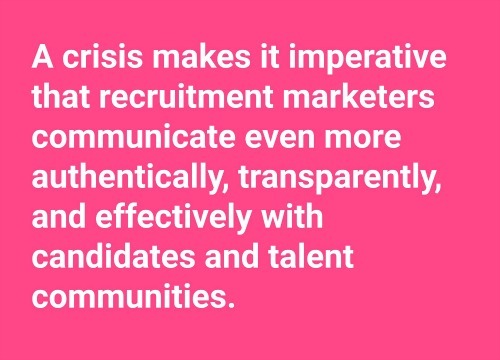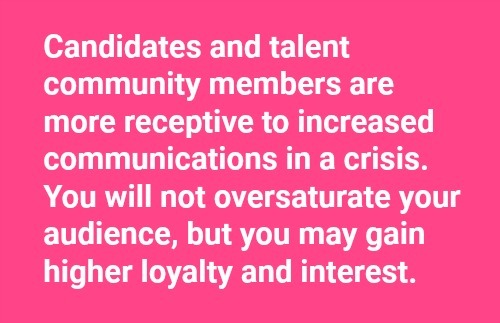Crisis communications for recruitment marketers
Public relations and traditional marketing experts are using their crisis communications best practices during the COVID-19 pandemic. Recruitment marketers, likewise, should be employing crisis comms strategies to best communicate to candidates their organizations’ response to the virus, and how it impacts candidates considering your company as an employer. Stories Inc.’s Head of Marketing, Jessica McFadden, has a background in traditional marketing and experience in crisis communications, and she provides expert counsel in crisis communications for recruitment marketers.
When the unknown happens, you must rely on the known.
No one knows how to perfectly handle recruitment marketing during a global coronavirus pandemic. As a recruitment marketer, what you do know is your organization’s values and its official, public response to the COVID-19 crisis. And you know the value of translating that information to your candidates and talent community. You know candidates are an important audience, and that they deserve communications that directly address how the crisis affects their standing with your company.
How your organization communicates with candidates during a time of heightened societal uncertainty and anxiety will determine their perceptions of working at your company.
I worked in the U.S. crisis communications practice of a global public relations firm during and in the three years following 9/11. The attacks necessitated immediate and unprecedented marketing responses for the majority of our clients. For our airline, government contractor, and financial industry clients, our marketing and media responses needed to be immediate. Our marketing plans for them utterly changed. For our clients in other industries, the adjustments in their marketing were less dramatic, however, their audiences were still dramatically feeling the effects of the crisis. Thus, every marketing plan and content piece was analyzed and adjusted for the changes to our society in the aftermath of 9/11.

Although the situations are not directly comparable, in my marketing career, nothing feels as close to our current COVID-19 crisis comms as my post-9/11 experience. In both situations, marketers are helping their organizations navigate a completely unknown landscape that is marred by fear, tragedy, and dramatic changes to people’s lives.
Now, every PR or crisis communications pro has a list of their rules of crisis communications. And large companies have a formal crisis communications strategy in case of possible tragedy, litigation, or scandal. But crisis communications tips for recruitment marketers? I looked and didn’t find rules that applied to our work.
So, I’ve developed these guidelines of crisis communications for recruitment marketers. In a nutshell, I believe a crisis makes it imperative that recruitment marketers communicate even more authentically, transparently, and effectively with candidates and talent communities.
1. Saying nothing is saying something.
Inaction is an action. Sometimes that is a safe strategy in traditional communications. But not saying anything doesn’t work for you, your company, or your candidates right now. If your candidate-facing communications channels have no mention of your company’s response to COVID-19 or how it impacts candidates, that’s still a message candidates hear. Instead of playing it safe by not mentioning the crisis, what you are communicating is organizational insecurity, or a lack of concern for the questions candidates naturally have.
You are the voice. Use your career site, talent community nurture, social recruiting, employer review site content and other channels to directly address how your company is responding to the crisis, and how this impacts candidates. Every candidate who is looking at those channels now will appreciate some additional reference to the crisis.

2. Take your seat at the communications table.
You know, I know, and other talent marketers know that recruitment marketing impacts the overall success of our organizations. Attracting the right talent is essential to our companies’ productivity, growth, and revenue — talent is everything. But, your communications colleagues are likely not thinking about that right now.
It’s up to you to get a seat at the table with your colleagues in the corporate and consumer communications departments. Do it! Take action to be a part of the comms strategies. Your role informs your company’s public perception as an employer, and you manage the channels critical to those perceptions. Share recent comments or questions from candidates that highlight the need for your voice in the overall crisis communications plan. Your colleagues will see how your role informs these critical channels.
3. Keep talking to candidates and your talent community.
We know it is hard to create content right now. Every LinkedIn post, every email communication is weighted by the factors related to this completely unique crisis. But whether your candidates are active or passive, or their search changes, their perceptions of your company’s response right now will remain with them for a long time to come. Your communications now need to directly address the crisis’s impact on hiring at your company.
If your organization needs to rapidly scale, you will obviously need to communicate this widely. But if your organization is freezing hiring, shifting hiring priorities, or is simply analyzing the situation carefully and doesn’t have a solid answer right now, you should directly tell your candidates, too.
4. Lean on your organization’s values and voice.
Your company core values and mission statements should be your guide right now. One thing you can control at the moment is ensuring that every piece of information you impart is true to your organizational values. Your content may be candidates’ first impression of how the company cares for employees or is responding to the crisis.
5. Communicate as often as you need for transparency and accuracy.
Don’t be afraid to communicate more candidly or frequently with your candidates than you did pre-coronavirus. No matter your industry or candidate audience, operate knowing that all people are hungry for more information right now. Candidates and talent community members are more receptive to increased communications. Internet usage has increased by 20-40 percent worldwide. Web-browsing has increased 70 percent in countries deeply affected by the pandemic, such as the U.S. Social media engagement is way up (61 percent) and social media channel usage is has dramatically increased (30-40 percent), too. Overall, email open and read rates have greatly increased as well (18-41 percent, depending upon sector). You will not oversaturate your audience, but you may gain higher loyalty and interest.

6. Share stories of what your company is doing for employees right now.
In the wake of the crisis, the employee experience has changed at your organization. Gather those stories and share them! Your audiences are hungry for stories of how your company has shifted to a remote work experience and are supporting remote teams. Candidates want to hear how your leadership and community is caring for employees’ mental and emotional health. If your industry is on the frontlines of the virus in any capacity, share your stories of collaboration and actions in response to COVID-19.
A great place to start in uncovering these employee stories is, again, with your company core values. Can you match a recent company, team or employee story with your organizational values? Ideally, your candidates will see, through these stories, if your organization’s values overlap with their personal values.
We’re here to help.
This content? It’s hard. No one has ever before had to communicate at a time like this. But it is so important.
The entire Stories Inc. team is working full steam ahead right now to serve the recruitment marketing needs of organizations during the COVID-19 crisis.
Our marketing team members (like myself, hi!) are serving as marketing resources, and our project team members are serving the content needs of our clients. We are finding that working to help others right now brings purpose to our own employee experiences.
We at Stories Inc. are here for you to help you navigate this unprecedented time, and best capture and share the stories that your audiences really want to hear. Send us a note if we can help you in any way.

